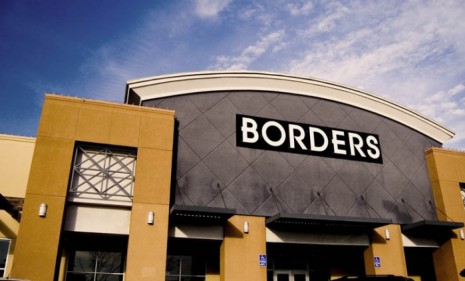Borders' liquidation: Winners and losers
Barnes & Noble may be cheering the demise of its chief rival, but small magazines and publishing houses will likely be hurting

A free daily email with the biggest news stories of the day – and the best features from TheWeek.com
You are now subscribed
Your newsletter sign-up was successful
After 40 years, Borders will be closing its remaining 399 stores. At its height, the bankrupt company operated more than 1,000 bookstores across the country. Who wins and loses with the cratering of the mega-bookstore chain?
WINNERS
Independent bookstores
The Week
Escape your echo chamber. Get the facts behind the news, plus analysis from multiple perspectives.

Sign up for The Week's Free Newsletters
From our morning news briefing to a weekly Good News Newsletter, get the best of The Week delivered directly to your inbox.
From our morning news briefing to a weekly Good News Newsletter, get the best of The Week delivered directly to your inbox.
"Remember the '90s, when big chain bookstores killed the independent shop?" asks Zoe So in The Village Voice. Unsurprisingly, given this turn of events, "there's a hint of schadenfreude floating about." Indeed, says Jeff Skrzypek at KEZI, "for smaller, independent bookstores it might actually be a blessing" — if a short-lived one. The Goliath Amazon is also looking to smash the nation's many David bookstores.
Barnes & Noble
Borders' closure "ultimately could lead to more business for Barnes & Noble," says Mae Anderson for the Associated Press. Some believe that, with its top brick-and-mortar competitor out of the picture, Barnes & Noble could pick up hundreds of millions in revenue. Still, Barnes & Noble has its own troubles: It put itself up for sale nearly a year ago, but has so far received interest from only one buyer, Liberty Media.
E-books
A free daily email with the biggest news stories of the day – and the best features from TheWeek.com
Media analyst James McQuivey, as quoted by the Associated Press, predicts that Borders' liquidation will accelerate the adoption of e-books, and expects sales will nearly triple by 2015, reaching $2.18 billion. That would be welcome news for Amazon's Kindle and Barnes & Noble's Nook, which lead the e-reader market.
LOSERS
Borders employees
The closing of Borders remaining 399 stores will mean that some 10,700 employees will lose their jobs. And with the unemployment rate at 9.2 percent, the timing is inauspicious.
Publishing houses
Borders' creditors "are not merely faceless asset-management firms; they have familiar names like Random House, Simon & Schuster, and HarperCollins," says Ian Crouch in The New Yorker. With Borders gone, those companies are out a lot of money. Plus, many book publishing employees will lose their jobs. "Because it was one of the top booksellers in the country, publishing houses had entire departments dedicated to working with Borders and its sales teams," says Rachel Syme at NPR. "An entire arm of book sales has been amputated."
Small magazines
"A great amenity of the dying bookstore megachains is the square footage devoted to magazines," says Lewis McCrary at The American Conservative. The typical Borders stocked hundreds of different titles, from Ploughshares to Cat Fancy to The Baffler. Independent bookstores often don't carry magazines, while traditional newsstands are dying out, leaving smaller publications with few outlets for distribution. "Like much of the chattering class, I used to sneer at the soulless quality of the bookstore chains — but when it comes to those long racks of colorful and varied journals, I will miss Borders."
Classical music
"The news of the Borders failure marks the end of another chapter in how classical music is distributed, sold and enjoyed," says Anastasia Tsioulcas at NPR. Sure, it wasn't the most amazing place for aficionados to buy Beethover and Bach, "but it still was a store that acknowledged classical music exists."
Kobo
"The impending shutdown of Borders Group Inc. has spelled uncertainty for Canadian digital bookseller Kobo, whose partnership with Borders marked the chain's too-little, too-late effort to cross over into the digital realm," says c. Borders, which sold and promoted the Kobo e-reader, owns an 11 percent stake in the company. With the Borders fire sale, that fate of that stake is unclear, though Kobo insists it will be just fine.
E-books
Amazon shouldn't break out the champagne just yet, says analyst Michael Norris, as quoted by the Associated Press. The death of Borders could lead to a decline in e-book sales, as people will no longer have a physical place to browse and research new titles that they later purchase on their e-readers.